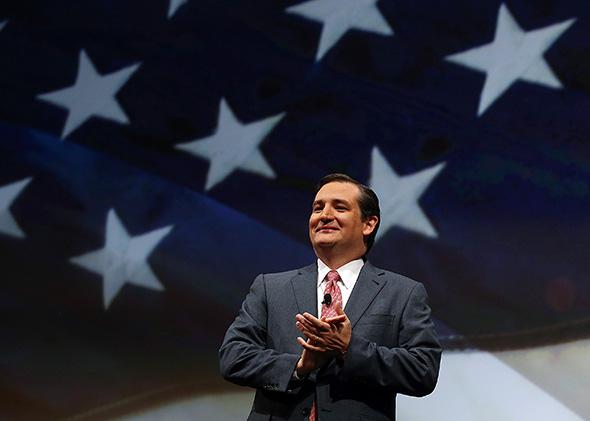What qualities do voters want in a president? A white male Protestant lawyer of European descent from a big state has been the historical answer, but the Pew Research Center recently asked this question to get a more current view. The results were bad news for the Senate’s class of presidential hopefuls, such as Ted Cruz, Rand Paul, and Marco Rubio. Republican Party voters like governors—and just about nothing about the Washington political system in which today’s senators serve.
But there’s good news for those candidates too: Voters don’t base their vote on the attributes they say they want.
For a long time, voters preferred members of Congress to governors. In 1987, 66 percent of voters in Pew polls said experience as a member of Congress provided better preparation for the White House, while just 22 percent said serving as governor was preferable. In 2007, congressional experience was still preferred by more than 2-to-1 (55 percent to 24 percent). Now, after two presidential terms of a former senator, the governors are making a comeback. Forty-four percent of the public says that serving in Congress better prepares someone to be president while as many say serving in a governor’s mansion is better preparation.
If you’re a Republican, it’s genuinely better to have been a governor. Republicans, by a 51-to-40 percent margin, say serving as a governor rather than as a member of Congress is a better warm-up for the presidency. It’s often said that GOP voters prefer governors, but in 2007 more Republicans believed experience in Congress (46 to 32 percent) was the best training ground.
It would be novel if voters revised their opinion because they had an epiphany about the skills required for the presidency. Instead, the shift is almost certainly another manifestation of voters’ hatred for Washington. Thirty percent of respondents in the new Pew poll said they would be less likely to support a candidate with “many years” of experience as an elected official in Washington while just 19 percent would be more likely. That’s a flip from seven years ago when more than twice as many saw lengthy Washington experience as a positive. Despite the recent lionization of LBJ and his legislative success, people don’t want candidates with the kind of experience that Johnson had.
Sens. Cruz, Paul, and Rubio could be discouraged about running for president—if voters hadn’t been so consistent about ignoring the things they say they want in a president. In the 20 years voters have said they preferred congressional skills to gubernatorial ones, America has elected three governors to two four-year terms—Reagan, Clinton, and Bush. Gubernatorial skills didn’t get more popular, but they clearly weren’t an impediment to office either.
In early 2007 voters placed military experience at the top of their list of attributes they said would make them more likely to vote for a candidate. That didn’t help veteran John McCain. Tea Party voters find military service particularly appealing. Seventy-one percent say it would increase the likelihood they would vote for a candidate. Yet Tea Party conservatives were some of McCain’s harshest critics. A version of the same was true for business experience and support for Mitt Romney among Tea Party members. Rep. Paul Ryan is the only possible presidential candidate who has “many years of experience” in Washington—precisely the kind of attribute Tea Party voters dislike so much—and yet, as a Tea Party favorite, he would almost certainly be forgiven for it.
The reason these questions about attributes tell us so little is that voters make their ultimate decisions based on other factors. The biggest reason voters pick a candidate is their party orientation (perhaps as much as 85 percent of the vote is determined by that alone, say political scientists).
Then voters weigh a candidate’s policy positions and make assessments of his or her character and integrity. If a candidate thinks the way I do about a policy or appeals to my values and emotion, I am likely to assume that he or she can do the job. “Do I trust this guy to solve this problem,” asks University of Missouri political scientist John Petrocik, imitating a voter’s thought process. “Something he says makes me trust him. I know he’ll deal with an issue because he’s saying things that I agree with, which makes me know he cares about it the way I do. Just talking about an issue persuades people that you are going to be able to do something.”
In the corporate world, a hiring committee would look at a candidate’s attributes to see if he or she had the skills for the job they were being asked to perform. It might make sense if presidential campaigns worked this way, too. But while voters have opinions about such matters, they just don’t act on them.
